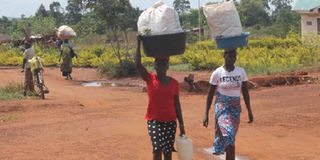How Ugandans risk their lives to dance at Congo nightclubs

Women carrying goods cross from DR Congo into Uganda at Salia Musala border area in Koboko District in March last year. PHOTO/ BY RASHUL ADIDI
What you need to know:
- This is after more than a year of closure of discotheques in Uganda due to Covid-19.
At Salia Musala, a border area that separates Uganda, DR Congo, and South Sudan in Koboko District, it is common to see boda boda riders evading security manning the official crossing points to crisscross the three countries.
The riders commonly use porous routes through the thick bushes and forests to sneak into DR Congo and go for disco, a popular genre of dance music in the area, especially on Tuesdays and weekends.
The boda boda riders risk to transport Ugandans comprising mainly youth to attend the dance in DR Congo. This is after more than a year of closure of discotheques in Uganda due to Covid-19.
Mr Moses Awule, a boda boda rider at the border, told Daily Monitor on Wednesday that they use the trails (panya) routes due to the tight restrictions imposed on them by security officers at the gazetted border points.
“I do cross to Congo either to take people for disco or to buy some goods there. But the problem is we are being over charged if you use the gazetted point, and this is why we use the panya (illegal routs),” he said.
Mr Awule added: “We know moving to Congo using the panya routes is risky but life is hard. This is our only means of survival. If we don’t do so, we can’t feed or even pay medical bills for our families.”
As they cross to DR Congo, the riders are sometimes arrested by the soldiers and police there.
For instance, on Tuesday, a 21-year-old boda boda rider, Mr Martin Alafi, a resident of Koboko Municipality, was shot and injured by armed men inside DR Congo.
He was returning from dropping off some youth for a party in DRC. Mr Alafi said he was shot by two plain clothed men and robbed of his motorcycle.
“I was returning from DR Congo at around 11pm when two men tried to stop me. When I insisted on riding, one of them shot me and I fell. They then robbed my motorcycle, phones and money,” he said.
Ms Gladys Apayi, who lives at the border, told Daily Monitor that there is laxity in enforcing the Covid-19 guidelines because of corruption.
Key challenge
“These people give some kitu kidogo (a colloquial Swahili term for a bribe) to these policemen who then allow them to cross. Going to Congo is risky but our youth are doing that to get something for survival, especially the boda boda men. But why can’t the youth who go for disco wait until Uganda opens the night clubs? It is very risky there,” she said.
The West Nile regional police spokesperson, Mr Hudson Ocen, told Daily Monitor that those found using illegal routes are being arrested and warned. “The boda boda men are using phones to communicate the whereabouts of security men on check points and it has made it difficult for us to trace them,” he said.
Mr James Data, the chairperson of Isoko Cell, which is close to the area where the shooting happened, said: “The incident happened next to my village when I heard gun shots at around 11pm. We learnt that it was a boda boda man was shot by gunmen in the leg. We rushed the bleeding boy to Rhema hospital for first aid.” Mr Data said the laxity by law enforcers has promoted the illegal border crossing.
“Ever since the President banned bars and night clubs due to Covid-19, many of our boys and girls from here have now turned to Congo. You know in Congo for them they say there is no corona; so youth and even elderly have taken advantage to cross over for disco. Some of them use the gazetted points while others use the porous border points,” he said.
There are many illegal crossing points in the area, making it difficult for the security agencies to stop the vice. Mr Emmanuel Amaku, the boarder internal security officer, said: “We have more than 17 porous border points between Uganda, Congo and South Sudan, which many people have been using for crossing. We only have three main officially gazetted ones and this is the biggest challenge why we are registering more cases of infections.”
What leaders say
The Arua District chairperson, Mr Alfred Okuonzi, called for talks between DRC and Ugandan authorities to stop the vice.“We need bilateral talks with our counterparts in DR Congo. Many of our youth are risking their lives to go to Congo for dances. This is common among the boys and girls in Logiri and Vurra sub-counties. It is unfortunate that they take it for fun. Yet they can carry the virus from there and also there is a lot of insecurity for them.”
Problem of smuggling
According to the Uganda Revenue Authority (URA), smuggling through the porous borders between Uganda, DRC and South Sudan is thriving, leading to loss of revenue and market share for local goods. The smugglers use routes that pass through bushes and remote areas to evade URA enforcement officers. Most of the goods are smuggled at night.
The smuggled goods include fuel, cigarettes, sugar, motorcycles, generators, and timbers, among others. Some of the smugglers use women to carry goods like sugar and cigarettes in small quantities to avoid detection by URA enforcement officers.
Most of the smuggled goods are purchased from DR Congo According to findings of a URA recent survey on the vice in West Nile, cigarettes are the most smuggled goods.



